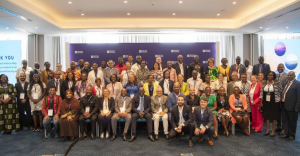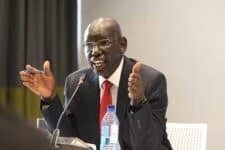In the three-day event themed Leading Inclusion and Belonging in Schools discourse, key areas including inclusive education for students with special educational needs and disabilities, advancing gender equality, and overcoming language barriers in the classroom were discussed.
State Department of Basic Education, Ministry of Education Principal Secretary (PS), Dr. Belio Kipsang, said that the country has invested in education subsectors by channelling 25 per cent of its resources and infrastructures to schools that handle children with special needs.

Speaking on Tuesday at the event, the PS added that top-up capitations are given to secondary schools worth Sh 37,000 for every learner with special needs, while primary schools get Sh 2,300 and grants that cater for staff who work for the children in the school environment.
He noted that there are about 240 million children with disabilities worldwide who have ambitions and dreams for their future and need quality education to develop their skills and realise their full potential.
The PS said that the children face persistent barriers to education stemming from discrimination, stigma, and the routine failure of decision-makers to incorporate disability in school services.
“In most cases, a student’s sense of belonging improves academic outcomes, increases continuing enrolment, and is protective for mental health, hence the need for us to create an environment in our learning institutions that makes the learners feel accepted and regarded,” he said.
Dr. Kipsang noted that the country has taken every measure and effort to provide equitable access to quality education for all students, including those with disabilities and marginalised, leading to a significant stride towards inclusive education by enrolling 100 per cent of children in primary and secondary schools.
“Enrolment rates for children with disabilities in special needs schools and those from ASAL areas has risen significantly,” he stated, adding that the ministry is also ensuring that learners with special needs are participating fully in co-curricular activities.
The PS highlighted the number of policies that aim to promote inclusive education, including the implementation of Free Primary Education and Free Day Secondary Education initiatives that ensure all children access education.
“As a show of commitment, Kenya is signatory to international instruments for the promotion of education for all, such as the Convention on the Rights of the Child and the Sustainable Development Goals,” said the PS.
Additionally, he said that despite the efforts and progress made, the country is still facing substantial challenges, including inadequate infrastructure, low retention rates in marginalised areas, shortages of trained teachers, and societal stigma.
Dr. Kipsang has called upon partners to work together in seeking intervention and addressing some of the challenges while the government and the Ministry of Education continue to put efforts into surmounting the challenges.
“We need to train more teachers and equip them with the necessary skills and engage the local communities in order to create awareness programmes that aim to reduce stigma and promote acceptance.
At the same time, he noted that adequate resources are required to improve facilities and support services for inclusive education and applauded the British Council for organising the dialogue and the collective implementation of education programmes.
Making his remarks, Country Director, British Council Kenya, Tom Porter, said that the British Council needs to explore ways to foster a sense of belonging and inclusion since their support focuses on peace and prosperity in building connections, understanding, and trust between the United Kingdom and countries worldwide through education such as arts, culture, language, and creativity that shapes the future.
“We have a strong range of activities in Kenya and a robust digital skills programme that helps people to acquire skills online and explore creative opportunities,” he said, adding that they are working with many partners, including the Ministry of Education.
He announced that next year, the British Council will focus on learners and workers assessment by preparing them for new opportunities and contributing to making the world a better place through their diverse experience for a positive change not only for inclusion but also for better decisions and outcomes.

